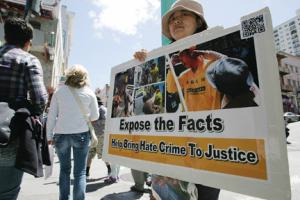China conflict spreads to San Francisco
By Dan Schreiber | 06/26/12
San Francisco Examiner

Political tensions from across the Pacific have moved to San Francisco, with members of the Falun Gong spiritual movement complaining of eight assaults in as many months during demonstrations against the Chinese government.
Video of one such assault at the corner of Grant and Washington streets was shown last week to the Board of Supervisors at City Hall, where demonstrators have been waving signs that say “San Francisco is not Beijing.” San Francisco police confirmed two attacks on demonstrators in June.
Sherry Zhang, a Falun Gong member who helped coordinate the City Hall action, said suspicion is rife within her movement that the opposition originates within the local Chinese Consulate-General. Consular officials did not respond to an interview request.
Police Officer Carlos Manfredi said the exact motivations for the assaults remain unclear.
“There’s something going on, but I’m not sure we can prove this person is a member of the Chinese Communist Party or not,” Manfredi said. “What we do have is misdemeanor battery. This is fairly new and we’re starting to get information about this.”
Falun Gong is a quasi-religious meditation practice that became widespread in the 1990s, when it was decried by China’s government as a cult that promotes “superstitious, evil thinking.” Some of its members subsequently immigrated to the United States to escape what they describe as torture, re-education camps and even black-market organ harvesting.
Supporters often can be seen meditating in San Francisco parks and in front of City Hall. And they stage demonstrations in Chinatown by displaying graphic photos of dead bodies that they say resulted from Chinese government brutality.
The local unrest comes as China prepares to undergo its once-a-decade government overhaul in November, ushering in new leaders who face mounting social problems and are portrayed as wanting to keep closer tabs on dissidents.
Zhang said Chinatown has long been marked by conflict stemming from overseas tensions. She noted that Falun Gong practitioners are barred from participating in the annual Chinese New Year parade.
“They escaped to this country and they thought it would be very safe,” Zhang said of such devotees. “There is law here guaranteeing people’s rights.”
Among members, Zhang said, there is a strong sentiment that local leaders shouldn’t allow First Amendment rights to be attacked.
In the video shown to supervisors, a man who lunged at Falun Gong demonstrators later sprawled out on the ground, presumably to act as if he had been the one who was attacked. An ambulance later transported the man to a hospital.
Manfredi encouraged members of the public who see such violence to “be a good witness” by trying to relay an accurate description of what happened and who did what to whom.
“We’re keeping records and keeping files on this,” Manfredi said. “We want to make sure everyone’s First Amendment right is protected.”
